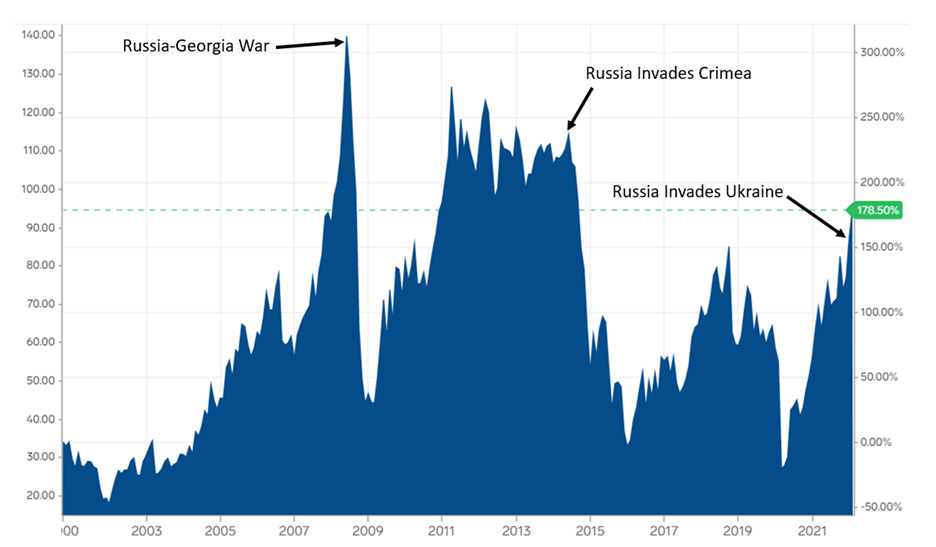Putin’s ill-advised military invasion into Ukraine has had a galvanizing effect across the world as country after country repudiates the war and pledges to arm or otherwise support Ukrainians fighting for their country. The economic impact of the war is still unfolding, but it is clear that the impact in Russia will be historically debilitating. The war will also significantly reshape the global energy landscape as fossil fuels-rich Russia fades from global influence and decarbonization efforts in Europe get a major jolt in the arm.
Oil & Gas Key to Putin’s War Politics
It can hardly be a coincidence that every military excursion that Russia has launched on Putin’s watch has happened during stretches of all-time high oil prices. During the August 2008 war in Georgia, crude oil prices were just coming off an historic high of almost $140/barrel (global benchmark crude Brent) set two months prior. Oil prices were similarly high in February 2014 when Russia seized Crimea ($108.21/barrel). Putin’s invasion of Ukraine came as the price for crude oil was over $90/barrel – a seven-year high.
Clearly, Putin uses record high oil prices to fill Russia’s coffers, fund the country’s war machine, and blunt the blow of international sanctions. Putin’s third attempt at such a strategy, however, is likely to be his most fatal.
Russia’s status as one of the most fossil fuels-rich countries in the world has allowed the country to maintain geo-political influence even as growing authoritarian tendencies in the country turned off many global democracies.
Many of the world’s global powers, like the U.S. and much of Western Europe, have performed an awkward dance with Putin’s Russia for years. On the one hand, these countries assume a confrontational posture on the global stage, criticizing Putin’s anti-democratic instincts, all while they maintain reliance on Russia’s oil and gas products behind the scenes. Those days are likely to change significantly, and Russia is poised to be the biggest loser as the latest upheaval to global energy politics reshuffles the world order. The Biden Administration took the unprecedented step recently to ban all Russian oil imports in what is perhaps the most severe sanction the United States has placed on Russia to-date. The NY Times’ ominous yet fitting headline about the move, The Future Turns Dark for Russia’s Oil Industry, accurately describes the bleak future that Russia now faces.
Europe Pledges an Even Greener Future
The fallout from Russia’s invasion of Ukraine has been unprecedented. European, American, and other democratic voices across the world have coalesced around a global strategy to send military support to Ukraine and isolate Russia through severe economic sanctions.
In the early days of the assault on Ukraine, German Chancellor Olaf Scholz announced the suspension of the Nord Stream 2 natural gas pipeline tied to Russian energy company Gazprom. President Biden also slapped sanctions specifically on the Nord Stream 2 AG company that is in charge of building the pipeline. This comes as countries like the United Kingdom, Canada, and others cascade sanctions on Russian energy giants Gazprom and Rosneft.
These moves, while good for the overall global push to adopt more renewables, leave Germany and other European countries in a tough spot. Germany in particular closed the door on nuclear power after the 2011 Fukushima disaster and pledged in 2019 to shutter coal-fired power plants by 2038. Reversing course on either at this juncture would be politically difficult, but reporting indicates that Germany is at least considering extending their coal phase-out plans.
To say that Germany has a complicated relationship with Russian gas would be quite the understatement. The country relies on Russia for two-thirds of its natural gas supply and one-third of its oil. Germany has almost no short-term leverage over Russia when it comes to severing these long-standing ties. That’s perhaps why Germany and other EU countries are all but slamming the door on any outright ban on Russian oil imports in the near future.
The short-term reality aside, the energy politics in Germany and across Europe have changed dramatically in favor of a greener future. German officials in particular are now more motivated than ever to fully embrace renewables back home. Germany recently announced plans to meet all of the country’s energy needs from renewable sources by 2035, an accelerated timeline from the previously set date of 2040.
Climate Change as National Security Threat
The predicament that Germany finds itself in is a perfect example of the growing ties between climate change and national security. This reality was underscored recently by a Ukrainian climate scientist, Dr. Svitlana Krakovska, at a UN climate meeting where she called out the common denominator for the worrisome near-term and long-term future her people face. Said Krakovska:
“Human-induced climate change and the war on Ukraine have the same roots—fossil fuels—and our dependence on them.”
It is no coincidence that recent wars and hostile military actions have been concentrated in and around major fossil fuel-producing countries. Iraq, Venezuela, Saudi Arabia, and Russia all come to mind. The more that the developed world can wean itself off of tainted global oil produced from hostile countries the better.
Just like Germany, the United States is reassessing its own predicament over global oil reliance. Amid sky rocketing gas prices, the Biden Administration is doing the once unthinkable; considering reaching out to Saudi Arabia to tap more of its oil reserves and considering the relaxing of oil sanctions previously placed on Venezuela. To put it mildly, Saudi Arabia and Venezuela aren’t exactly saints on the global peacekeeping front. The fact that the United States is so reliant on fossil fuels from such bellicose countries to meet its energy needs is highly problematic to say the least.
Combating climate change has long been positioned in moral terms, and increasingly, in economic terms as the costs of renewables have dramatically fallen in recent decades. The ongoing crisis in Ukraine is now forcing everyone to view the problem through the lens of sovereignty. It is not only the climate that is at stake, but the very nature of sovereignty for much of Europe is at stake as well. The best way to diminish the geo-political influence of petro-aggressor states like Russia is to commit to an energy policy that puts renewables at the center of a plan for energy sovereignty.
Cover Photo Source: World Economic Forum








